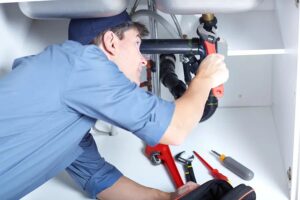A plumbing emergency can rapidly cause your daily flow to reverse. Imagine this: You are drinking morning coffee when water bursts out from behind your kitchen sink. Finding an emergency plumber becomes your only thought as the urgency rises. Enough to cause your head to spin are burst pipes, blocked drains, overflowing toilets. Let’s investigate the worst offenders and find some sensible preventative advice.

First among them are ruptured pipes. They enjoy choosing the coldest days to fail, freezing then cracking broadly open. The Insurance Information Institute estimates that burst pipe water damage calls for thousands of repairs annually. What is the best defense available? In crawl spaces, garages, and attics, insulate pipelines. Open cabinet doors during cold spells so warm air reaches pipes beneath sinks. Another tip from the experts is to drip your faucets just so gently in harsh cold. It keeps water flowing, therefore reducing the freezing risk.
The traditional choked drain comes next. Everywhere in bathrooms and kitchens, it is the villain. Usually, the offender is an unholy alliance of food wastes, grease, soap scum, and hair. Avoidance? Wear drain guards. Let oil harden instead of pouring it down the sink; then throw it. Not damaging pipes, regular cleaning using vinegar and baking soda works miracles. You should not disregard water draining slower than a snail. Act early before the pipe chooses to totally block.
Leaky faucets: how monotonous, exactly? Actually, not to mention your growing water bill, that steady leak results in gallons of water lost over time. Usually the cause is a worn-out O-ring or a washer. For the most part, even a beginner do-it-yourselfer can replace these with some patience and YouTube direction. Check fittings and taps on a regular basis. Time to send in the cavalry if the leak comes from the base or if you spot unanticipated moist areas around the house.